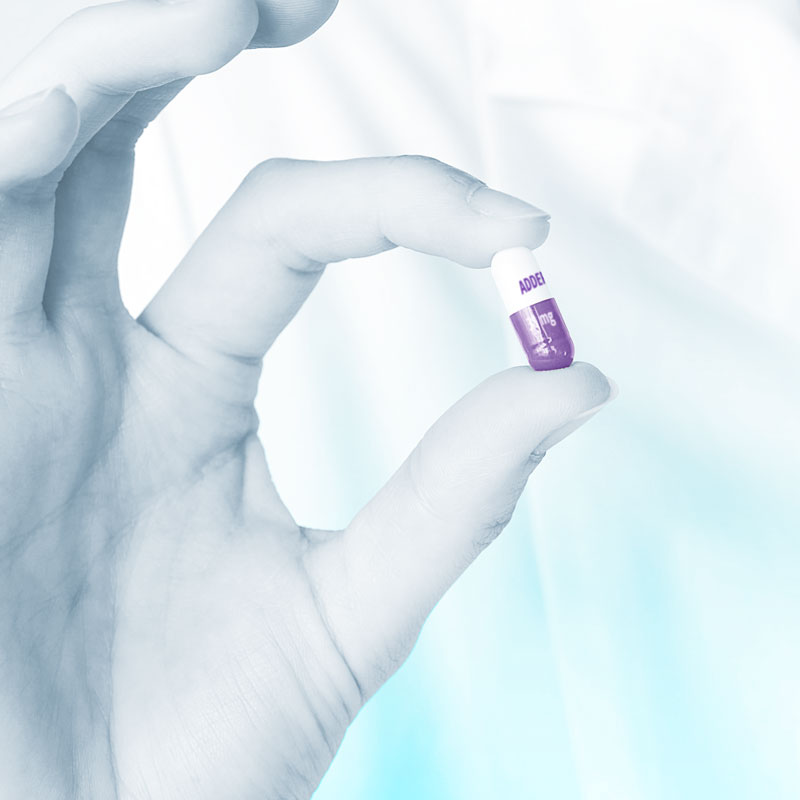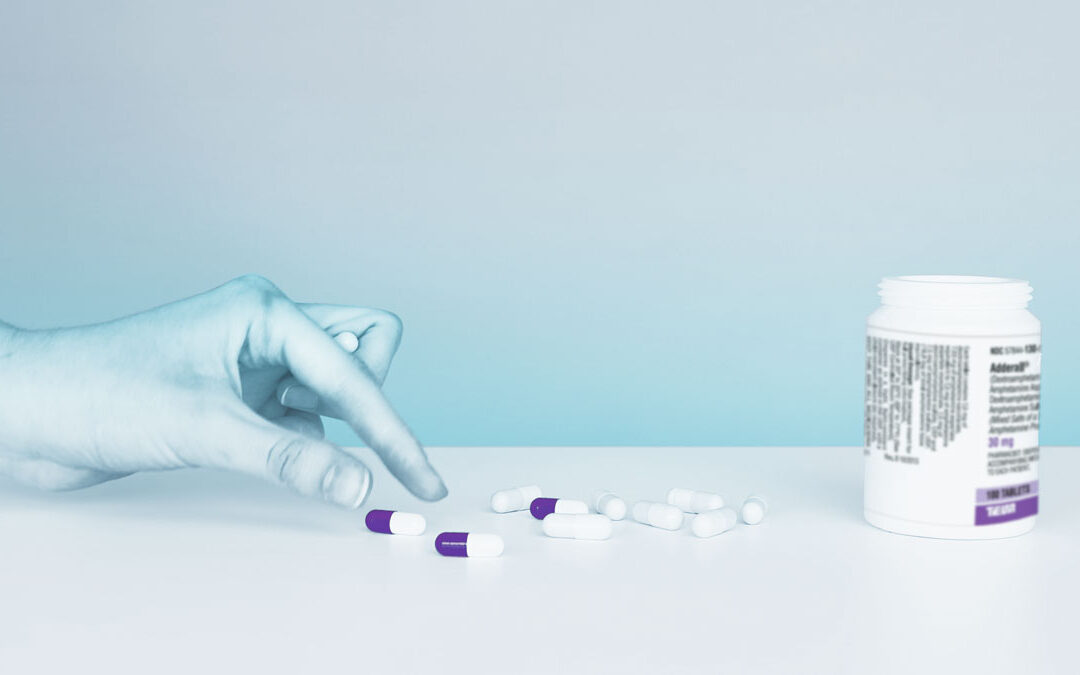Adderall Misuse in Adults
Adderall is a unique combination medication used to treat disorders such as attention deficit hyperactivity disorder (ADHD) and in certain cases, narcolepsy. It is one of the most widely prescribed drugs, and although it helps millions of individuals, it can be abused. The misuse of Adderall is not widely talked about, but it does occur. Each year, roughly 4% of emerging adults misuse Adderall and other similar stimulants.

What is Adderall?
Adderall belongs to a class of drugs known as stimulants and it is dispensed in pill form. It is referred to as a combination drug because it is a combination of two stimulants – dextroamphetamine and amphetamine. These two drugs improve attention and control some behavioral issues by stimulating the central nervous system. Adderall is a prescription drug, so it can only be purchased with a prescription from a doctor. There are two current forms of Adderall available – immediate-release and extended-release and its generic name is dextroamphetamine-amphetamine.
How Does Adderall Work?
As previously stated, Adderall works by stimulating the central nervous system. More precisely, it increases the amount of serotonin, dopamine, and norepinephrine in the brain. The increase of these neurochemicals brings the user down from a state of overstimulation to a state of baseline stimulation. In short, the drug impacts the part of the brain responsible for controlling impulsivity and hyperactivity while removing the “fog” associated with indecision and inattention. For individuals suffering from ADHD, the drug allows them to experience a higher degree of stillness in their bodies and minds. The increase in dopamine results in greater focus and clarity.
Is Adderall Addictive?
Adderall is safe as long as it is taken for the right reasons and taken as prescribed by a physician. Unfortunately, when Adderall is taken for non-prescribed reasons, the risk of developing an addiction to the drug becomes far greater. Adderall is classified as an amphetamine by the United States Drug Enforcement Agency (DEA) and as a Schedule II controlled substance, so the potential for abuse and addiction is relatively high. Taking, distributing, or selling Adderall without a prescription is illegal and can result in jail time. When Adderall is not medically needed and its dosage is not monitored by a physician, it can cause a variety of dangerous side effects, including addiction.
Adderall is an addictive drug, so if you take enough of it over time, your brain will become accustomed to it. From a biological perspective, taking repeated doses of an addictive substance, such as Adderall, can chemically alter your brain. The body can build up tolerance to the drug and over time, individuals who are addicted will find they need more of the drug more frequently to produce the desired effect. Substance abuse disorder, especially when it involves Adderall, can cause severe health and social problems. Those addicted to the drug often find it difficult to meet the responsibilities associated with work, home, and school. Stimulants such as Adderall are some of the most commonly abused prescription drugs.
Signs of an Adderall Overdose
As stated, Adderall is generally safe when taken under the supervision of a trained medical professional, but unfortunately, it is possible to overdose on the drug. It is important to note, however, that when taken in conjunction with other drugs or medications, it is possible to overdose on less than the average lethal dose of Adderall. Adderall can interact negatively with a host of antidepressants, blood pressure medications, antacids, and cold or allergy medications. When Adderall is taken with alcohol, the chances of alcohol poisoning, life-threatening overdose, or coma increase significantly. Signs of an Adderall overdose include:
- Rapid breathing
- Stomach pain
- Vomiting
- Hallucinations
- Fever
- Tremors
- Heart Attack
In rare cases, death can occur when a person ingests too much Adderall.
Physical and Behavioral Signs of Adderall Addiction
The Diagnostic and Statistical Manual of Mental Disorders (DSM) places Adderall abuse within the stimulant use disorder category. Historically, there was some differentiation between addiction and physical dependence, however, the most recent versions of the DSM combine both concepts under the rubric of substance use disorders. According to the most recent version of the DSM, the following symptoms are often present in individuals suffering from Adderall or stimulant addiction:
- Withdrawal symptoms when the usual amount of Adderall is not ingested
- Having to take higher doses of Adderall or taking it too often to get high
- Continuing to abuse Adderall even though it causes severe psychological and physical problems
- Putting off responsibilities related to core spheres of life, such as work, family, or school in order to take Adderall
Individuals who abuse Adderall often crush and snort the pills so the stimulant will be delivered to be brain faster.
Additional Behavioral Signs of Addiction
There are numerous behavioral symptoms of Adderall abuse, and some are quite obvious. Since Adderall is a prescription drug, those experiencing addiction will often “doctor shop,” or go from doctor to doctor, to obtain a prescription. Such individuals will often go to various pharmacies to get the prescriptions filled and to avoid detection. Often, those addicted to Adderall will have a host of prescription drug bottles from a variety of pharmacies that have been prescribed by a variety of doctors. Adderall can also be purchased on the street if a person does not have a way to obtain it legally.
Individuals who abuse Adderall will often leave behind paraphernalia. For example, a person who injects the drug may utilize a syringe, heating device, spoon (usually with heat marks), and a belt or rope. Those who crush Adderall may use anything capable of crushing a pill, such as a hammer, espresso stopper, or a mortar and pestle. Since Adderall is often snorted, tools used to snort Adderall will be needed, so it is not uncommon for individuals to use straws, dollar bills, or a hollowed-out pen. To create Adderall lines, abusers may use anything with a sharp edge, such as a credit card (which may have leftover residue on the edge).
There may also be signs of Adderall abuse when it comes to the way a person pays for the drug. To fund their habit, an abuser may spend a significant amount of their resources, including money in their checking or savings account, work wages, and cash advances from credit cards. If there are other financial assets available, such as a pension plan or Certificate of Deposit, they may be liquidated to pay for Adderall. Objects of value at home and work may go missing as well. If a person is in college and struggling with Adderall addiction, they may begin to use their book money or tuition to pay for their abuse.
There may also be a noticeable shift in a person’s social life once they become addicted to Adderall. They may become secretive, and some individuals may completely withdraw from their friends and family members. When a person struggling with substance abuse does choose to interact, it is often only with others suffering from the same condition. These individuals will often use drugs in groups.
Recovering From Adderall Addiction
It is possible to recover from Adderall addiction and live a normal life again. With the help of medical professionals such as psychiatrists, nurses, physician assistants, and therapists, individuals can discover why they abuse the drug and craft a comprehensive plan to stop their abuse. Recovery becomes even more of a possibility when a person has adequate social support from friends and family members. Here at Clean Recovery Centers, we understand the root causes of addiction and we strive to help individuals from all walks of life suffering from substance abuse disorder. The longer Adderall abuse continues, the more difficult it becomes to hide, so don’t hesitate to contact us if you believe a loved one is struggling with addiction.
Learn More About Adderall Misuse
If you or someone you know is misusing Adderall and struggling with addiction, there is help available. You don’t have to suffer alone, and with our help, you can live a normal life free of addiction. Contact Clean Recovery Centers today to learn more.
Sources:
- https://www.nimh.nih.gov/health/topics/attention-deficit-hyperactivity-disorder-adhd
- https://www.healthline.com/health/adderall-addiction
- https://www.healthline.com/health/dopamine-effects
- https://www.webmd.com/drugs/2/drug-63163/adderall-oral/details
- https://publichealth.jhu.edu/2016/adderall-misuse-rising-among-young-adults
- https://www.webmd.com/drug-medication/adderall-abuse-addiction-signs
- https://www.drugabuse.gov/publications/drugfacts/prescription-stimulants
- https://www.ncbi.nlm.nih.gov/pmc/articles/PMC1524735/


